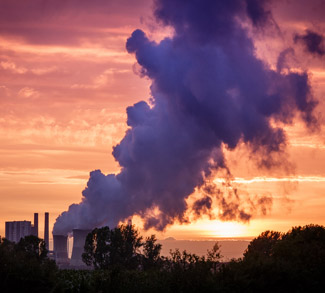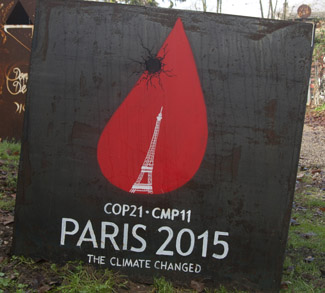December 2015, the world’s attention focused on Paris, France. It was the second time within a month that the French capital captured all media headlines, only this time for a far more promising reason: our leaders reached an agreement on establishing binding commitments for the prevention of dangerous global temperature increases. Only a few months have passed, and there are those who already lament COP21 under current low oil and natural gas prices. There’s more reason to be optimistic, however, as the current low-price energy market creates a rare opportunity to implement fundamental changes in our emission footprints.
In recent months – as last Sunday’s summit at Doha just showed – our attention has mostly shifted to OPEC, Russia, and other producer countries, speculating how they would respond to the collapse of their commodity-driven revenues. Yet at the prelude to the Paris summit, all eyes were on the presidents of two entirely different countries: China and the United States. The issue of CO2 emissions is an issue of energy consumers. They are accountable for their share in transitioning our atmosphere’s composition – which facilitates the phenomena of global climate change. In a period where energy supply exceeds demand, consumers should take advantage of the situation and enforce new policies that sanction excessive emissions and reward emission efficiency.
In fact, this trend has already started taking place. India and Indonesia, for example, have cut fuel subsidies and many other countries are incorporating a form of carbon taxation. Japan is examining its return to producing nuclear energy at the expense of gas imports. Yet such efforts are not enough. Coal, for instance, incontestably the dirtiest fossil fuel, is also the least taxed energy source worldwide – even less than renewables! And although it is believed coal consumption will peak by 2025, this still means a decade of increased production and emissions.
The United States has quickly become the world’s largest oil and natural gas producer, and is estimated by many to turn into a net exporter of energy by the end of the decade. Subsequent calculations derive a significant addition to GDP and job creations.
As important as any measure taken by any nation is, efforts to combat climate change will be negligible without full participation by the United States and China. The world’s two largest economies are responsible for almost forty-five percent of global carbon dioxide emissions. Excessive pollution, the effects of slowing growth on economic competitiveness, and climate issues are adding to international pressure on Beijing to take substantial measures to reduce its emissions. Yet the world’s largest energy consumer refuses to unilaterally handicap its ability to catch up with developed economies, and American discourse doesn’t signal any of the determination required by the Chinese to follow suit.
One reason is the effect of the shale gas and tight oil revolution the United States experienced over the past decade. The United States has quickly become the world’s largest oil and natural gas producer, and is estimated by many to turn into a net exporter of energy by the end of the decade. Subsequent calculations derive a significant addition to GDP and job creations – gaining popular support for the protection and nourishment of this industry. However, these calculations should also take into account the added costs resulting from the effects of climate change to the national economy. For instance, only seven years apart, hurricanes Katrina and Sandy have cost the US economy $180 billion. Historically either would have been considered a once-in-a-century event. Forest fires in the west have also risen in frequency and magnitude. Supporting domestic production should not go unrestricted, but should – at the very least – better incorporate the long-term implications of its externalities.
Another fault would be to put too much faith in natural gas. It is perceived as a cleaner fossil fuel than coal or oil, which would generate a certain improvement for relative emissions – but production still produces CO2; and the issue of methane from natural gas exploitation is still a point of contentious debate leading some experts to challenge natural gas as a lower carbon alternative. Projections for the next twenty years expect natural gas to gain a greater market share at the expense of oil and coal, but fossil fuels combined would still provide over eighty percent of the growing demand for global energy. Furthermore, as projections are being regularly updated, the share of gas actually declines! The problem with over reliance on natural gas is that it discourages further investments from renewables and alternative solutions – especially when hydrocarbon consumption prices are so low.
Consumer behavior does not sufficiently associate current prices with their environmental implications. This is illustrated in recent car sales data. 2015 marked an increase of SUVs and trucks compared to a dramatic decline in the sales of hybrid and electric vehicles. Therefore a broader policy is essential to drive the change. There are various possibilities that can influence consumer and producer behavior in ways which will reduce overall national emissions. From carbon taxation, through a robust system of incentives to the equivalence of a sovereign wealth fund, results can be achieved. Lessons should be learned from current policies aimed at reducing the use of ozone-depleting substances, such as the Clean Air Act Amendments of 1990 and the HCFC Allowance System. Experts also suggest that climate constraints are actually comparable to the historic performance of oil companies’ stocks, meaning that mark ups can be incorporated under existing economic performances. There is also a growing consensus that because hydrocarbons are so prevalent in every economic activity, restraints would not breach the World Trade Organization’s regulations.
The Paris Convention took place while oil already traded at less than $35 a barrel. Consuming countries can now better leverage the energy market to reach their commitments and obligations. The longer they wait, should prices recover, the harder will it be to sway producers to adjust. And most importantly, the longer it takes for real action on climate change, the more emissions are released into the atmosphere, making future policies more abrupt.
Let the landmark signing ceremony at the United Nations headquarters this Friday serve as a reminder: the time to act is now.
The opinions, beliefs, and viewpoints expressed by the authors are theirs alone and don’t reflect any official position of Geopoliticalmonitor.com.




